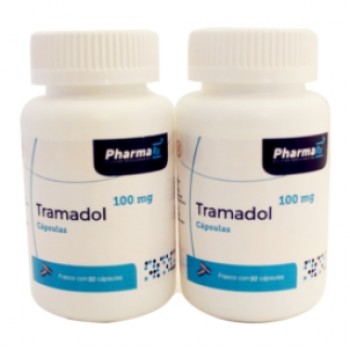
Tramadol 100 mg 50 cap
**IMPORTANT: when ordering more than 4 items of this product you must pay for an extra shipping fee, we will not ship orders bigger than 4 items per package because it encreases probable retention at customs**
Tramadol may be habit forming, especially with prolonged use. Take tramadol exactly as directed. Do not take more of it, take it more often, or take it in a different way than directed by your doctor. While taking tramadol, discuss with your health care provider your pain treatment goals, length of treatment, and other ways to manage your pain. Tell your doctor if you or anyone in your family drinks or has ever drunk large amounts of alcohol, uses or has ever used street drugs, or has overused prescription medications, or if you have or have ever had depression or another mental illness. There is a greater risk that you will overuse tramadol if you have or have ever had any of these conditions.
Tramadol may cause serious or life-threatening breathing problems, especially during the first 24 to 72 hours of your treatment and any time your dose is increased. Your doctor will monitor you carefully during your treatment. Tell your doctor if you have or have ever had slowed breathing or asthma. Your doctor will probably tell you not to take tramadol. Also tell your doctor if you have or have ever had lung disease such as chronic obstructive pulmonary disease (COPD; a group of diseases that affect the lungs and airways), a head injury or any condition that increases the amount of pressure in your brain. The risk that you will develop breathing problems may be higher if you are an older adult or are weak or malnourished due to disease. If you experience any of the following symptoms, call your doctor immediately or get emergency medical treatment: slowed breathing, long pauses between breaths, or shortness of breath.
When tramadol was used in children, serious and life-threatening breathing problems such as slow or difficulty breathing and deaths were reported. Tramadol should never be used to treat pain in children younger than 12 years of age or to relieve pain after surgery to remove the tonsils and/or adenoids in children younger than 18 years of age. Tramadol should also not be used in used in children 12 to 18 years of age who are obese or who have a neuromuscular disease (disease that affects the nerves that control voluntary muscles), a lung disease, or obstructive sleep apnea (condition in which the airway becomes blocked or narrow and breathing stops for short periods during sleep) as these conditions may increase their risk of breathing problems.
Taking certain other medications during your treatment with tramadol may increase the risk that you will experience breathing problems or other serious, life threatening breathing problems, sedation, or coma. Tell your doctor if you are taking or plan to take any of the following medications: amiodarone (Nexterone, Pacerone); certain antifungal medications including itraconazole (Onmel, Sporanox), ketoconazole (Nizoral), and voriconazole (Vfend); benzodiazepines such as alprazolam (Xanax), diazepam (Diastat, Valium), estazolam, flurazepam, lorazepam (Ativan), and triazolam (Halcion); carbamazepine (Carbatrol, Epitol, Equetro, Tegretol, Teril); erythromycin (Erytab, Erythrocin); certain medications for human immunodeficiency virus (HIV) including indinavir (Crixivan), nelfinavir (Viracept), and ritonavir (Norvir, in Kaletra); medications for mental illness, nausea, or pain; muscle relaxants; phenytoin (Dilantin, Phenytek); quinidine (in Nuedexta); rifampin (Rifadin, Rimactane, in Rifamate); sedatives; sleeping pills; or tranquilizers. Your doctor may need to change the dosages of your medications and will monitor you carefully. If you take tramadol with any of these medications and you develop any of the following symptoms, call your doctor immediately or seek emergency medical care: unusual dizziness, lightheadedness, extreme sleepiness, slowed or difficult breathing, or unresponsiveness. Be sure that your caregiver or family members know which symptoms may be serious so they can call the doctor or emergency medical care if you are unable to seek treatment on your own.
Drinking alcohol, taking prescription or nonprescription medications that contain alcohol, or using street drugs during your treatment with tramadol increases the risk that you will experience these serious, life-threatening side effects. Do not drink alcohol, take prescription or nonprescription medications that contain alcohol, or use street drugs during your treatment.
Tell your doctor if you are pregnant or plan to become pregnant. If you take tramadol regularly during your pregnancy, your baby may experience life-threatening withdrawal symptoms after birth. Tell your baby's doctor right away if your baby experiences any of the following symptoms: irritability, hyperactivity, abnormal sleep, high-pitched cry, uncontrollable shaking of a part of the body, vomiting, diarrhea, or failure to gain weight.
If you are taking the tramadol extended-release tablet or capsule, swallow them whole; do not chew, break, divide, crush, or dissolve them. Swallow each tablet right after you put it in your mouth. If you swallow broken, chewed, crushed, or dissolved extended-release preparations, you may receive too much tramadol at once instead and this may cause serious problems, including overdose and death.
Do not allow anyone else to take your medication. Tramadol may harm or cause death to other people who take your medication, especially children.
**IMPORTANT: when ordering more than 4 items of this product you must pay for an extra shipping fee, we will not ship orders bigger than 4 items per package because it encreases probable retention at customs**
